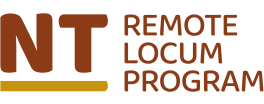Larry King began working in remote Indigenous communities in 2007 through a nursing agency. He has also nursed overseas. Looking for a new adventure but somewhere closer to home, Larry signed up with RAHC and so far has completed three placements in the Northern Territory, including one year Yuendumu and two six week placements - at Nyirripi and Lajamanu.
When Larry first heard about RAHC he was working as a Registered Nurse in the Emergency Department at Melbourne Hospital. It wasn’t long before he commenced his work with RAHC in Ampilatawaja.
“Despite having worked remotely before with another organisation, I still received two valuable information days on culture and clinical skills,” Larry said. “Once I arrived at my post I received phone and e-mail contacts for two clinical support staff. I also had phone contact with the local manager in Alice [Springs] as well from head office in Canberra. The support from RAHC was terrific.”
Before working in the Northern Territory, Larry says he didn’t realise the extent to which remote Aboriginal communities could benefit from RAHC assistance.
“Over the years I’d seen footage of remote communities; however it wasn’t until driving into a community that I was hit with the thought, ‘Could this really be happening in Australia?’ The preconceptions I had that conditions were poor were annihilated by the obvious fact that conditions were far worse that I’d thought.”
Initially, Larry found language barriers and unfamiliarity with cultural practices to be a challenge, as well as varying presentations to those he was used to seeing in Melbourne. “However with the CARPA manuals, other experienced staff and support on the other end of the phone, things got easier over time,” Larry said.
“I was fortunate that the first clinic was relatively new and purpose-built, taking into account gender specific entrances and waiting rooms, with up-to-date equipment. I felt quite comfortable and able to perform the duties expected of me.”
RAHC health professionals provide support to the hard-working permanent health workforce in remote Northern Territory communities. Professionals like Larry contribute to the improved health and wellbeing of Indigenous children, young people and families. After experiencing the work firsthand, Larry believes the initiative will ultimately benefit the Indigenous community.
“At present there are a multitude of health services and delivery models for communities throughout the Northern Territory, all working to achieve better outcomes for Indigenous people.
“It is imperative that we aim to deliver high quality health care that is long term and sustainable to reduce the enormous gap in health status of non-Indigenous and Indigenous [Australians] and I believe RAHC is working towards this,” said Larry.
Despite initial culture shock and a concern that he would not know how to instinctively nurse a patient in a culturally appropriate way, Larry says he would definitely work for a similar project in the future. “Somehow it has become a part of me,” he said. “Despite not wanting to work for long periods in remote communities it is usually not that long after being home in Melbourne that I begin to miss that red sand, the climate, the diversity of the work load and autonomy that comes with working remotely and I feel myself compelled to go back.”
For others interested in the program, Larry recommends thorough research. “Try to see any documentaries so that the visual on arrival is not as confronting as it was to me, participate in some form of cultural awareness program like the one RAHC provides, and be very aware of your own attitudes.”
“I knew very little about the Aboriginal culture so it was great to learn about it by living in it. I was taken out-bush hunting, even the women showed me various things. I certainly got to see first-hand the disparity between the health of Indigenous and non-Indigenous [Australians] and I got to learn about health conditions that particularly affect Indigenous people living in remote communities.”
Larry says that one of his favourite memories from his time in the Northern Territory happened unexpectedly.
“I was going to check on a young girl at dusk; she had a fever,” he said. “As I arrived at the house, she was sitting on the verandah and it started to rain quite heavily, which it hadn’t done for maybe a year. Suddenly as I was taking her blood pressure, I had about 20 or so young children, half clothed, dancing around me in the rain, squealing with delight and laughing. They all wanted to get involved in what I was doing. With the sunset, the rain, the warmth and their smiling faces it was a long way from Melbourne and it was delightful.”
Would you like to share your RAHC experience with other Health Professionals? We are always looking for RAHC Health Professionals to tell us about their experience, by preparing a RAHC story. If you are willing to share your story, please contact your Placement Consultant or email us.
